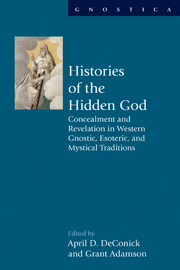 Histories of the Hidden God
Histories of the Hidden God Book contents
- Frontmatter
- Contents
- Acknowledgments
- Contributors
- Introduction: In search of the hidden God
- Part I Concealment of the Hidden God
- Part II The Human Quest for the Hidden God
- Part III Revelations of the Hidden God
- 11 Revealing and concealing God in ancient synagogue art
- 12 The invisible Christian God in Christian art
- 13 On the Mothman, God, and other monsters: The demonology of John A. Keel
- 14 Hidden away: Esotericism and Gnosticism in Elijah Muhammad's Nation of Islam
- 15 Conscious concealment: The repression and expression of African American Spiritualists
- 16 Occulture in the academy? The case of Joseph P. Farrell
- Afterword: Mysticism, Gnosticism, and esotericism as entangled discourses
- Bibliography
- Index
15 - Conscious concealment: The repression and expression of African American Spiritualists
from Part III - Revelations of the Hidden God
- Frontmatter
- Contents
- Acknowledgments
- Contributors
- Introduction: In search of the hidden God
- Part I Concealment of the Hidden God
- Part II The Human Quest for the Hidden God
- Part III Revelations of the Hidden God
- 11 Revealing and concealing God in ancient synagogue art
- 12 The invisible Christian God in Christian art
- 13 On the Mothman, God, and other monsters: The demonology of John A. Keel
- 14 Hidden away: Esotericism and Gnosticism in Elijah Muhammad's Nation of Islam
- 15 Conscious concealment: The repression and expression of African American Spiritualists
- 16 Occulture in the academy? The case of Joseph P. Farrell
- Afterword: Mysticism, Gnosticism, and esotericism as entangled discourses
- Bibliography
- Index
Summary
In 1933, the same year she became a Spiritualist, Nellye Mae Taylor joined the National Colored Spiritualist Association of the United States of America. Experiences with racial discrimination in the churches of the National Spiritualist Association of the United States, both in Oklahoma and Kansas, led her to join the organization … African Americans were not permitted to conduct service or give readings.
These highly emotional services seem to produce an unbalanced state which robs the individual of inhibitions which make him a reasonable being and capable of self control … The Negro who could “get happy” most often at these hysterical religious meetings was usually the weakest morally in the community. He, or she, would steal, indulge in crimes of violence and not infrequently in sexual crime.
The opening excerpts, the former a biographical snapshot of an African American Spiritualist and the latter a statement made by an African American sociologist, capture the historical predicament confronting Spiritualists of African descent. Taken together, these two citations show the sandwiching of African American Spiritualists between two compounding forces. On the one hand, these Spiritualists faced opposition in modern American Spiritualism because of their race. Their blackness, especially during the rise of institutional forms of segregation in the late nineteenth century, served as the primary reason for their ejection from the National Spiritualist Association in particular and the modern Spiritualist movement in general. On the other hand, Spiritualists of African descent, because their religious expression did not fit neatly in a traditional mold of African American Christianity, were rejected by many members in their own community.
- Type
- Chapter
- Information
- Histories of the Hidden GodConcealment and Revelation in Western Gnostic, Esoteric, and Mystical Traditions, pp. 281 - 297Publisher: Acumen PublishingPrint publication year: 2013


